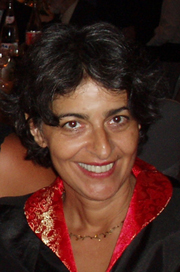Filed Under > International
Helping Pakistan Professionalize Its Teachers
Teachers College is hosting a visit by 22 high-ranking Pakistani education officials and provincial leaders to New York City and Washington as part of a USAID-funded project to professionalize Pakistan's teachers and significantly upgrade the quality of education in the nation's primary and secondary schools.
Under the $5 million, three-year Teachers College collaboration (which is part of a larger, $75 million effort by USAID), all of Pakistan’s teachers will be encouraged to hold four-year and two-year teaching degrees in their field by 2018. Since 2009, Teachers College faculty members have been working with 15 Pakistani universities in four provinces, as well as with the global non-profit Education Development Center (EDC), to create an undergraduate 136-credit, four-year teaching degree and a two-year associate’s teaching degree. The program will include a nationally approved curriculum and will also provide resources for a formalized field of education research in Pakistan. During their visit to the United States, the members of the Pakistani delegation are refining their strategic plans to bring their schools and regions up to speed with the new effort, and also are visiting local colleges and public schools.
The USAID grant was received, and the project and study tour are administered, by TC’s Office of International Affairs.
“This is the only program in Pakistan focused on preservice teacher education,” says the project’s principal investigator, Gita Steiner-Khamsi, Professor of Education in Teachers College’s Department of International and Transcultural Studies.
The Teachers College collaboration represents tangible fruits of the Enhanced Partnership with Pakistan through the Kerry-Lugar legislation that provides annual U.S. aid to Pakistan.
Despite Pakistan’s reputation as a nation that values education and has a strong scientific infrastructure, the need for educational change in primary education is dire, according to Dr. Mahmood Butt, Chief of Party of the USAID Teacher Education Project.
“We are in the midst of an educational emergency,” says Dr. Butt. “There are 7 million children who are not in school. Fifty percent of all students drop out of school between grades 1 and 3. In addition, 55 percent of children completing grade 5 cannot read a story at grade 2 level. And because of population growth, Pakistan is also one of the few nations in the world where illiteracy is on the rise.”
Dr. Butt links these problems directly to the state of teacher preparation in his country. Butt describes the current system as “an inheritance of the 19th century normal school model," with a hodgepodge of programs that award teaching certificates to, in some instances, people whose educational attainment ends at the tenth-grade level. Overall, 70 percent of Pakistan’s 1.3 million primary and secondary school teachers are considered inadequately prepared.
USAID chose Teachers College as a partner for several reasons, including a desire to create a long-term partnership between the higher education systems of the two countries; the College’s pioneering success in making qualitative improvements in teacher education; and TC’s educational philosophy.
"From John Dewey onwards, Teachers College has been the leader of the progressive education movement,” says Dr. Butt. “As an institution, it has historically asked questions such as, ‘How do we think? and’ ‘What is the scientific method of solving problems?’ So we came to the mecca of educational reforms."
Muhammad Tariq Khan, Senior Education Advisor for USAID, based in Islamabad, said that the project is one of the flagship education projects of USAID in Pakistan with the innovative and constructive approaches that are providing support to the Government of Pakistan institution to take the leadership, with TC and EDC providing technical assistance to build capacity so that the effects are sustainable.”
A precursor to the Teachers College project developed national professional standards for teachers that have been nationally adopted by Pakistan’s Ministry of Education. Since then the project itself has eliminated many outmoded teacher certification programs, structured the new four-year teaching degree program and created curricula for the initial two-year associate’s degree.
Now a group of educators who have completed the associate’s degree program are working under the direction of two Teachers College emeritus professors, Frances Schoonmaker and Margaret Jo Shepherd (both of whom are frequent visitors to Islamabad), to design the curriculum for the final two years of degree program.
Link to Where the US and Pakistan are working together (published by The Christian Science Monitor)
Published Thursday, Jun. 7, 2012
